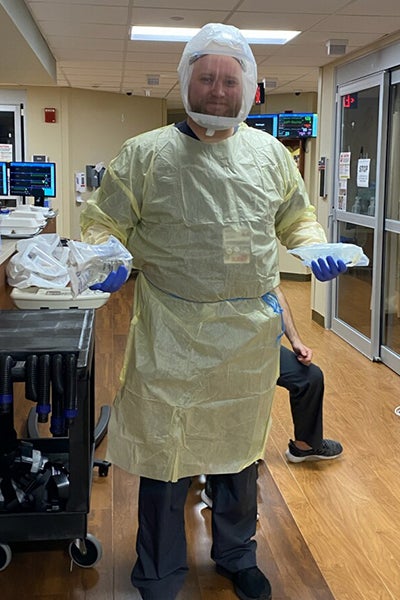‘This is a marathon, not a sprint’
Tom McClure, BSN ’18, RN, medical ICU nurse at Memorial Medical Center in Springfield, Illinois Heading link

As a medical ICU nurse at Memorial Medical Center in Springfield, Tom McClure, BSN ’18, RN, is used to seeing patients with life-threatening conditions. But after caring for his first critically-ill COVID-19 patient, what surprised him was how quickly the virus attacked the patient’s lungs, causing them to turn from black (indicating oxygen flow) to white (lack of oxygen) on the X-ray.
“It’s pretty crazy,” he says. “These are complete white-outs. You don’t typically see that happen so fast.”
For his six days as the patient’s nurse, McClure followed meticulous precautions to provide care. He used hand sanitizer on his way into an ante room attached to the patient’s room, where he suited up in protective gear, including a special, air-filtering hood called a PAPR (powered air purifying respirator). A safety officer watched to make sure he was fully covered, then allowed him into the patient’s room, which was outfitted with negative airflow to constantly suck air out of the room. (Because the coronavirus can stay on surfaces for up to three days, the airflow pulls the particles out.)
McClure says he’s grateful for the safety officers, who he says, “keep him honest.”
“They stop us from doing something dumb,” he says. “No, you can’t run in there [unprotected] and do CPR.”
He’s careful at home, too. He and his wife developed a ritual. When he returns home from a shift, she sprays disinfectant spray on him before he enters the house. Then he puts his clothes immediately in the laundry and takes a shower. They also take their temperatures every night, and treat themselves to “quarantinis,” Emergen-C and vodka.
At the hospital, visitors are no longer allowed except for special circumstances, such as a patient who is dying. McClure’s critical COVID patient had eight to 12 IV pumps for various medications. He says he would normally be in the room monitoring them on a constant basis, but it was recommended that he only go in the room every two hours.
“They want us to be protected,” he says. “This is a marathon, not a sprint.”
McClure’s experience was reported on in the Chicago Tribune (subscription required) and The Pantagraph in Central Illinois on Apr. 3.